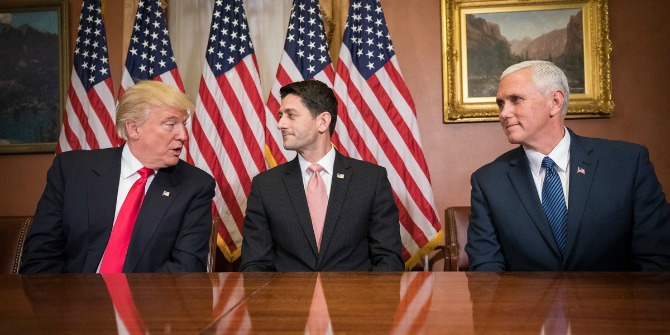 Gaining endorsements is key for candidates who seek their party’s nomination for the presidency. Carlos L. Yordán analyses the endorsements of nearly 300 US governors, Senators, and members of the House of Representatives for former president Donald Trump in the 2024 election. He writes that many Republican leaders who were cautious or even opposed Trump have now backed him, with the former president using these endorsements to rally the Republican establishment behind his conservative agenda. So far, Trump has garnered the endorsements from 76 percent of Republican governors and members of Congress; he has clearly consolidated support from the Republican Party establishment.
Gaining endorsements is key for candidates who seek their party’s nomination for the presidency. Carlos L. Yordán analyses the endorsements of nearly 300 US governors, Senators, and members of the House of Representatives for former president Donald Trump in the 2024 election. He writes that many Republican leaders who were cautious or even opposed Trump have now backed him, with the former president using these endorsements to rally the Republican establishment behind his conservative agenda. So far, Trump has garnered the endorsements from 76 percent of Republican governors and members of Congress; he has clearly consolidated support from the Republican Party establishment.
A few weeks ago, Mike Pence, former Vice President under Donald Trump, made headlines by announcing he would not endorse the former president in the upcoming election. While Pence’s decision itself was not entirely unexpected, the subsequent media attention it garnered was noteworthy. For instance, a Politico piece highlighted how the Biden campaign and the organization Republican Voters Against Trump capitalized on Pence’s announcement, using it in advertisements to cast doubt on Trump’s fitness for office and his conservative credentials. Similarly, an Associated Press article recently remarked on the significance of Pence’s stance:
The decision makes Pence the latest in a series of senior Trump administration officials who have declined to endorse their former boss’s bid to return to the Oval Office. While Republican members of Congress and other GOP officials have largely rallied behind Trump, a vocal minority has continued to oppose his bid.
While numerous journalists and commentators often emphasize how dissenting voices within the Republican Party might hinder Trump’s efforts to unify the party and potentially lead to defeat in the upcoming election, their analyses often overlook the fact that Trump has been remarkably successful in mobilizing Republicans in ways that seemed improbable just a year ago. Back then, many believed that Florida Governor, Ron DeSantis, could secure the nomination over Trump. Despite facing two impeachments, 91 criminal charges, and criticism for his divisive rhetoric, which some Republicans find objectionable, Trump has managed to garner widespread endorsements.
Are political endorsements truly impactful?
Recent political history gives us a mixed picture. In the 2016 Republican presidential caucuses and primaries, party leaders notably refrained from backing Trump, instead throwing their support behind the campaigns of Senators Marco Rubio, Ted Cruz, and other Republican candidates. Despite Trump’s limited support from the Republican establishment, he clinched the nomination and ultimately emerged victorious in the election against former Secretary of State Hillary Clinton.
Fast forward to 2020, when Joe Biden faced several setbacks, losing key contests in Iowa, New Hampshire, and Nevada. However, his fortunes changed dramatically following South Carolina Congressman James Clyburn’s endorsement, propelling him to victory in the state’s primary. Concerns about Senator Bernie Sanders’s electability against Trump led many of Biden’s rivals to rally behind him and offer their endorsements.
In contrast to 2016, Trump has actively pursued endorsements from Republican leaders in this election cycle. A year ago his numerous legal issues raised doubts among conservative voters and elected Republican officials regarding his electability, fitness for office, or brand of conservatism. These concerns motivated DeSantis, former South Carolina Governor Nikki Haley, former New Jersey Governor Chris Christie, and several other politicians to challenge Trump’s aspirations of securing the party’s presidential nomination.
By accumulating endorsements, the Trump campaign aimed to stifle any momentum rival campaigns could gather. For example, to weaken Haley’s prospects of winning her home state’s primary, ahead of the vote he strategically announced endorsements from several of South Carolina’s most influential elected Republican officials. This tactic reassured voters that Trump retained the backing of the party’s establishment, thus bolstering his frontrunner status.
As endorsements grew, Republican leaders who were initially cautious due to Trump’s past or had previously supported other candidates shifted their support to the former president. Trump effectively utilized these endorsements to rally the Republican establishment behind his conservative agenda, moving it out of Ronald Reagan’s shadow. With his now undisputed leadership within the party, Trump can tap into the financial networks of his endorsers to strengthen his presidential campaign. Additionally, amidst Trump’s numerous legal battles, he will likely spend considerable time in courtrooms. To compensate for his absence, these endorsers will serve as invaluable allies, engaging in campaign events, rallying support among the party base, and mobilizing voter turnout.
Analyzing Trump’s endorsements
I have compiled a database containing the names of all Republican governors, US senators, and House members, totaling 295 elected officials. Utilizing data from FiveThirtyEight’s 2024 endorsement tracker, a tally maintained by Jard Gans of The Hill, and Google News searches, I have tallied the number of these officials who have endorsed Trump as of March 27, 2024.
Trump has gained endorsements from 76 percent of these potential endorsers. Table 1 below outlines the distribution of endorsements based on the type of elected office.
Table 1 – Comparison of Trump’s endorsements by type of elected official

Figure 1 below shows the timeline of Trump’s endorsements, beginning after he announced his candidacy for the 2024 Republican presidential nomination in the fall of 2022.
Figure 1 – Trump’s endorsements by elected Republican officials over time
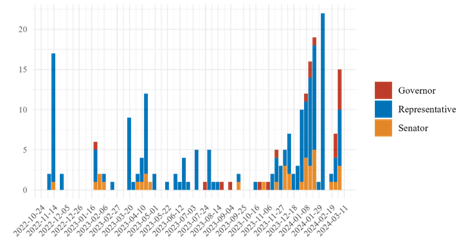
Figure 1 shows that members of the US House of Representatives were among the first to endorse Trump’s candidacy. These included some of Trump’s staunchest supporters, such as Florida’s Matt Gaetz, Georgia’s Marjorie Taylor Green, and New York’s Elise Stefanik. Most senators and governors have decided to endorse Trump within the past six months. After significant wins in key primaries like Iowa, New Hampshire, South Carolina, and Super Tuesday, numerous cautious Republican officials, especially those in leadership roles, were convinced to publicly endorse his reelection bid. In fact, many supporters of North Dakota Governor Doug Burgum, DeSantis, and Haley switched their allegiance to Trump once these candidates concluded their campaigns.
Figure 2 below illustrates Trump’s success in securing endorsements from most states. However, it is important to highlight that despite his widespread support, his campaign must strengthen its position in certain battleground states. Take Georgia, for instance, where Trump faces allegations of meddling in the 2020 election results; he currently holds 70 percent of the potential endorsements. Of greater concern is Wisconsin, where his endorsement count stands at a mere 43 percent, or North Carolina where he has captured 63 percent.
Figure 2 – Trump’s endorsement capture among Republican officials by state
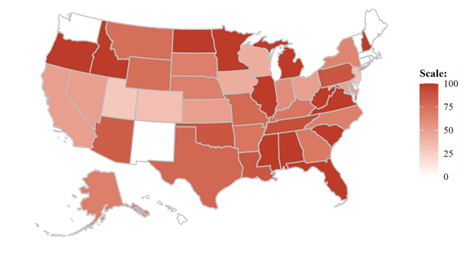
While Trump’s weaknesses in these states may be concerning for his campaign, his ability to secure high percentages of endorsements in Arizona (83 percent), Pennsylvania (88 percent), and Michigan (100 percent) highlight some its strengths. These achievements underscore his enduring popularity, resonance with conservative voters, and adept navigation of regional dynamics. Such strong endorsements not only bolster Trump’s candidacy but also serve as a testament to the effectiveness of his campaign’s strategies in building alliances and mobilizing support in key battleground states.
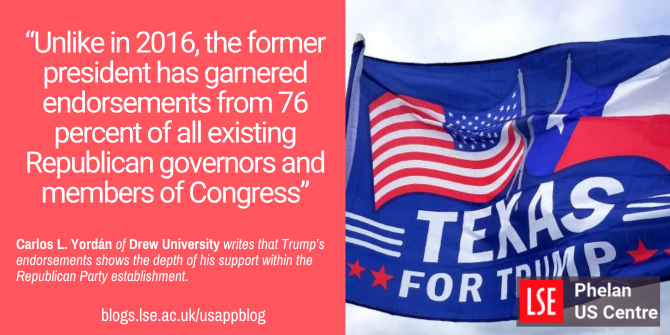
“”Texas For Trump” flag” (CC BY-NC-ND 2.0) by Gilbert Mercier
Which Republican officials are more inclined to endorse his candidacy? Using Progressive Punch’s district tilt data, a statistical test shows that Republican House members from strong or lean Republican districts are more likely to endorse Trump than those members in swing districts (Figure 3).
Figure 3 – Relationship between US House of Representatives District’s tilt and Trump’s endorsements
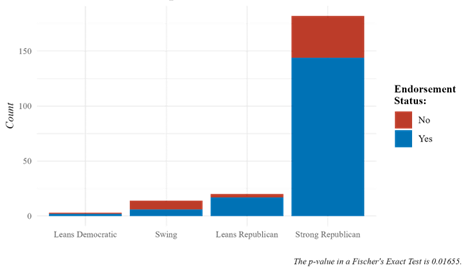
Figure 4 shows a similar pattern when analyzing US Senators who have endorsed Trump.
Figure 4 – Relationship between US Senate seat’s tilt and Trump’s endorsements
As shown in Table 1 above, Trump has secured the endorsements of 70 percent of Republican governors. One might expect that the more Republican leaning a state is, the greater the likelihood that its governor would endorse Trump. However, this assumption does not hold. For instance, the governors of Indiana, Montana, Utah, and Wyoming—some of the country’s most conservative leaders—have not endorsed the former president. While Georgia’s governor, Brian Kemp, has indicated his support for the Republican nominee, he has refrained from formally endorsing Trump. Kemp’s criticism of Trump’s immunity claims underscores the rift between the two leaders, complicating the presidential campaign’s efforts to utilize Kemp’s resources to mobilize the state’s Republican and conservative-leaning independent voters.
Figure 5 summarizes the demographics of elected Republican officials who have endorsed Trump.
Figure 5 – Demographics of officials who have endorsed Donald Trump in the 2024 presidential election

Given that many polls suggest Trump faces potential weaknesses among women voters—a challenge magnified by his being found liable for sexually assaulting E. Jean Carroll—it is noteworthy to observe that such a high percentage of female Republican leaders have endorsed the former president. However, Nikki Haley’s decision not to endorse his candidacy presents a potential obstacle as his campaign endeavors to further unify the party leading up to the summer’s Republican National Convention. Similarly, Alaska Senator Lisa Murkowski’s and Maine Senator Susan Collins’s choices to refrain from endorsing Trump and to criticize his proposed policies could impede Republicans’ efforts to attract the support of moderate women voters.
One of the unexpected findings from recent election surveys is Trump’s increasing popularity among underrepresented minority groups, typically known for supporting Democratic presidential candidates. While the number of Republican elected officials from these groups is limited, it’s intriguing to observe Trump’s ability to secure 92 percent of potential endorsements. These officials are poised to assist the Trump campaign in garnering support from these voters come November.
Donald Trump has consolidated GOP establishment support
Since his victories in Super Tuesday’s nomination contests, political journalists and commentators have emphasized the challenges Trump faces in unifying the Republican party. However, many of these analyses overlook a crucial point: unlike in 2016, the former president has garnered endorsements from 76 percent of all existing Republican governors and members of Congress. Although my database of Trump’s endorsements does not include endorsements from other statewide officeholders or state legislatures, the data clearly illustrates Trump’s success in consolidating support within the Republican establishment.
The Trump campaign continues to grapple with numerous challenges. Presently, its fundraising endeavors trail behind President Joe Biden’s impressive fundraising machinery. Additionally, Trump must set aside any grievances with Haley and actively pursue her endorsement ahead of the Republican National Convention in July. Haley has proven to be a proficient fundraiser and campaigner, making her an invaluable asset to the campaign.
While Trump may currently lead in national and battleground state polls, the race is bound to tighten as the November election approaches. To navigate this evolving landscape successfully, Trump must enlist the support of elected officials who have endorsed his candidacy. Their backing will play a crucial role in galvanizing the party’s base and mobilizing Republican and conservative-leaning independent voters to turn out on Election Day.
- Please read our comments policy before commenting.
- Note: This article gives the views of the author, and not the position of USAPP – American Politics and Policy, nor of the London School of Economics.
- Shortened URL for this post: https://wp.me/p3I2YF-dJV





